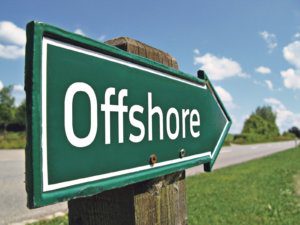
The insurance companies of Ukraine that are members of the Motor (Transport) Insurance Bureau of Ukraine (MTIBU) in January-August 2018 increased collection of premiums for compulsory vehicle owners’ civil liability (OSAGO) by 21% compared with the same period in 2017, to UAH 2.962 billion. According to the MTIBU’s website, the number of OSAGO contracts for the eight months increased by 4.6%, to 5.254 million.
The total volume of insurance claim fee payments under internal insurance contracts, according to the MTIBU, rose by 14.2%, to UAH 1.404 billion. In particular, UAH 218.8 million was paid using EU accident report forms, which is 49% more than in January-August 2017. The bureau also recorded the reduction in the number of settled claims for insurance compensation by 0.05%, to 88,800, of which 24,900 (an increase of 27%) using EU accident report forms.

Some international experts believe that Switzerland and Luxembourg should be added to the list of offshore countries. They propose changing transfer pricing laws and toughening control over exports and increase transparency of the State Fiscal Service of Ukraine to reduce the removal of profits from Ukraine. These are the conclusions of the authors of a study, titled “Profit flows from Ukraine’s iron ore exports” conducted with the support of the European United Left – Nordic Green Left (GUE/NGL) European Parliamentary Group initiated by independent trade unions of Kryvy Rih. The study presented in Kyiv said Ukraine’s economy loses about $3 billion annually because profits are removed from Ukraine. When exporting iron ore, prices were allegedly deliberately lowered by an average of 20%, as a result. In 2015-2017, tax losses and the withdrawal of profits from the country amounted to $520 million per year. Based on other studies, prices for agricultural products and metal exports are undervalued by more than 20%.
Chief researcher Oleksandr Antoniuk said macro-financial assistance of the European Union at that time was $460 million per year.
According to him, this study was presented at a press conference in the European Parliament last week and its results were published in the Spiegel publication.
In turn, Pavlo Vikniansky, one of the leaders of the Republic party, said that “the oligarchic clans of Ukraine systematically withdraw huge amounts of money to offshore companies.”
According to the study, the authors proposed to hold a public discussion of changes in legislation on transfer pricing to eliminate all clauses that allow exports at reduced prices, to disclose information on taxes in the extractive industries paid by exporters outside Ukraine, in line with EU directives.
In addition, it is proposed to disclose information of the State Fiscal Service on the control of export operations, if necessary, make changes to the legislation on trade secrets.
The authors also support the control of all major export operations, regardless of the export geography and the exporter’s connection with the importer, return Switzerland and Luxembourg to the list of offshore zones and analyze tax rates in other countries importing Ukrainian goods in detail.

Biosecurity agencies of India have decided to open the Indian market for Ukrainian apples, the Ukrsadprom association has reported on its website.
According to the report, Ukrainian apples harvested in 2018 can already be delivered to India, if the established phytosanitary conditions are observed. The Indian side determined the special conditions for supply of Ukrainian apples, in particular, keeping them until shipment from Ukraine at a temperature of 0 centigrade for 13 days, which should be indicated in the phytosanitary certificate.
“The opening of the Indian market for Ukrainian apples is the number one event not only for gardeners, but also for Ukraine as a whole. India is able to completely replace the Russian market, which was the main one for Ukrainian apples until 2014, and also would lead to the need to improve the technology of growing and storage, which was not required for the Russian market, since the time of transportation to India is about a month,” Head of the Ukrsadprom association Dmytro Kroshka said.
In addition, in his opinion, this will lead to the development of maritime logistics of fruits when exporting from Ukraine, will give the opportunity of significantly increasing the trade turnover between Ukraine and India, given the volume and significantly higher cost of Ukrainian apples compared to, for example, grain crops exported to India.